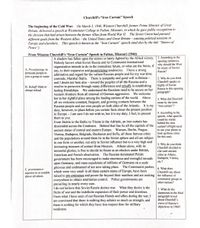Question
thumb_up100%
6.
7.

Transcribed Image Text:6. What does Churchill say about the influence of communist groups in other nations?
7. What do the statements in the final paragraph reveal about Churchill's views of Russia's
10163

Transcribed Image Text:Churchill's "Iron Curtain" Speech
The beginning of the Cold War: On March 5, 1946, Winston Churchill, former Prime Minister of Great
Britain, delivered a speech at Westminster College in Fulton, Missouri, in which he gave public recognition to
the division that had arisen between the former Allies from World War II. The Soviet Union had pursued
different goals from the Western Allies – the United States and Great Britain – causing political tensions in
Europe and elsewhere. This speech is known as the "Iron Curtain" speech (and also by the title "Sinews of
Peace").
From Winston Churchill's "Iron Curtain" Speech in Fulton, Missouri (1946)
1. According to the
opening sentences,
A shadow has fallen upon the scenes so lately lighted by the Allied victory.
Nobody knows what Soviet Russia and its Communist international
organization intends to do in the immediate future, or what are the limits, if why should the West
any, to their expansive and proselytizing tendencies. I have a strong
admiration and regard for the valiant Russian people and for my war-time
comrade, Marshal Stalin. There is sympathy and good will in Britain –
and I doubt not here also - toward the peoples of all the Russias and a
resolve to persevere through many differences and rebuffs in establishing
lasting friendships. We understand the Russians need to be secure on her
western frontiers from all renewal of German aggression. We welcome
her to her rightful place among the leading nations of the world. Above
all we welcome constant, frequent, and growing contacts between the
Russian people and our own people on both sides of the Atlantic. It is my
duty, however, to place before you certain facts about the present position
in Europe - I am sure I do not wish to, but it is my duty, I feel, to present
them to you.
From Stettin in the Baltic to Trieste in the Adriatic, an iron curtain has
descended across the Continent. Behind that line lie all the capitals of the curtain? (Might need
ancient states of central and eastern Europe. Warsaw, Berlin, Prague,
Vienna, Budapest, Belgrade, Bucharest and Sofia, all these famous cities
and the populations around them lie in the Soviet sphere and all are subject
in one form or another, not only to Soviet influence but to a very high and
increasing measure of control from Moscow. Athens alone, with its
immortal glories, is free to decide its future at an election under British,
American and French observation. The Russian dominated Polish
be weary of Soviet
Russia?
A. Proselytizing- to
persuade people to
join a group or cause
2. Why do you think
Churchill speaks so
highly of Soviet
Russia in this opening
paragraph?
B. Rebuff- blunt or
abrupt refusal
3. What did Churchill
mean by the term
"iron curtain"?
4. According to the
speech, what specific
countries reside
behind the iron
to use your phone to
look up these cities
for this one)
5. Why do you think
Churchill decided to
cite such ancient
cities as Athens,
Budapest, Vienna,
etc.?
government has been encouraged to make enormous and wrongful inroads
upon Germany, and mass expulsions of millions of Germans on a scale
grievous and undreamed of are now taking place. The Communist parties, 6. What does
which were very small in all these eastern states of Europe, have been
raised to pre-eminence and power far beyond their numbers and are seeking the influence of
everywhere to obtain totalitarian control. Police governments are
prevailing in nearly every case.
I do not believe that Soviet Russia desires war.
fruits of war and the indefinite expansion of their power and doctrines.
From what I have seen of our Russian friends and allies during the war, I
am convinced that there is nothing they admire so much as strength, and
there is nothing for which they have less respect than for military
C. preeminence-
superior to or notable
above all others
Churchill say about
communist groups in
other nations?
What they desire is the
7. What do the
statements in the final
paragraph reveal
about Churchill's
views of Russia's
objectives in 1946?
weakness.
Expert Solution
This question has been solved!
Explore an expertly crafted, step-by-step solution for a thorough understanding of key concepts.
This is a popular solution
Trending nowThis is a popular solution!
Step by stepSolved in 2 steps
